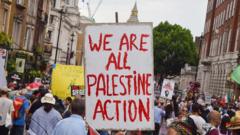Why Is the Met Chief Shocked by the Upcoming Palestine Action Protest?

Understanding the Controversy Surrounding Palestine Action and Planned Protests in London
The recent developments concerning Palestine Action and its planned protests in London have stirred significant debate and controversy. With the Metropolitan Police chief expressing shock and frustration at the group's actions, the landscape of public protest is facing scrutiny amid ongoing tensions regarding the conflict in Gaza. This article delves into the nuances of the situation, exploring the implications for freedom of expression, the legal frameworks surrounding protests, and the broader context of the Israeli-Palestinian conflict.
The Current Situation: Protests and Police Response
On a forthcoming Monday, a protest in support of Palestine Action is set to take place in London. Commissioner Sir Mark Rowley of the Metropolitan Police has articulated his concerns regarding the planned demonstration. He emphasized the importance of peaceful protest but indicated that actions supporting Palestine Action might overstep the bounds of what is considered legitimate protest.
Palestine Action, a group known for its direct action against arms companies, has been at the forefront of protests against the UK’s military support for Israel. The group’s recent activities include a break-in at RAF Brize Norton, where activists vandalized military planes as a statement against UK policies. This incident has drawn condemnation from various political figures, including Prime Minister Sir Keir Starmer, who labeled the actions as "disgraceful." The counter-terrorism police are currently investigating this event, heightening the tension surrounding the upcoming protest.
Legal Implications of Protesting
Despite the uproar, the Metropolitan Police have indicated that they currently lack the legal authority to prevent the protest from occurring. However, they have stated that they can impose conditions to manage the event, aiming to prevent disorder and protect community safety. This brings to light the legal frameworks that govern public demonstrations in the UK, particularly in the context of national security and public order.
- Right to Protest: The right to assemble and protest is enshrined in UK law, allowing individuals and groups to express their views publicly.
- Conditions on Protests: Authorities have the power to impose conditions on protests to mitigate disruptions, which can include restricted areas and time limits.
- Proscription of Groups: The government is considering proscribing Palestine Action as a terrorist organization, which would significantly alter the legal landscape surrounding their protests.
The Political Landscape
The planned proscription of Palestine Action has ignited a political firestorm. While some lawmakers, like former Home Secretary Suella Braverman, have expressed support for the ban, others, including Labour MP Zarah Sultana, have voiced concerns about the implications for civil liberties and the right to protest. The tension reflects a broader division in political opinion regarding the Israeli-Palestinian conflict and the role of activism in response to international crises.
Public Sentiment and Activism
Public opinion on Palestine Action and the planned protests is polarized. Supporters argue that the group’s actions are a necessary response to what they view as state-sponsored violence and complicity in human rights violations. Conversely, critics, including government officials and some members of the public, view the group's tactics as extreme and counterproductive, potentially undermining legitimate discourse on the crisis in Gaza.
Humanitarian Concerns in Gaza
The ongoing conflict in Gaza has resulted in catastrophic humanitarian consequences. Reports indicate that since the onset of hostilities on October 7, 2023, over 55,000 people have lost their lives, including a staggering number of children. The international community continues to grapple with calls for ceasefires and humanitarian aid, while activists argue for accountability and an end to military support for Israel.
Palestine Action: Goals and Tactics
Palestine Action’s primary objective is to disrupt the supply chains of companies that manufacture arms used in conflicts, particularly in Gaza. Their recent actions, including vandalism of military assets, are framed as escalations in response to perceived escalations in violence against Palestinians.
Members of the group, like Saeed Taji Farouky, have articulated their belief that their actions are aimed at "breaking the material supply chain to genocide." This provocative rhetoric highlights the emotional and moral motivations behind their activism, which they argue is a response to the severe humanitarian crisis unfolding in Gaza.
The Response from Authorities
As authorities consider the proscription of Palestine Action, there are significant implications for how protests are managed in the UK. The government’s stance reflects a growing concern over the potential for unrest and the need to maintain public order, especially in the context of a highly charged political climate.
The Broader Implications for Civil Rights and Freedoms
The potential proscription of Palestine Action raises critical questions about civil rights, freedom of expression, and the boundaries of acceptable protest in a democratic society. Amnesty International has expressed concern over the use of counter-terrorism powers to target protest movements, arguing that such measures could set a dangerous precedent for curtailing civil liberties.
As tensions mount, it is crucial for society to engage in discussions about the implications of these actions and the importance of maintaining a balance between security and the right to protest. The ongoing conflict in Gaza serves as a backdrop for these debates, intertwining humanitarian concerns with questions of political expression.
Conclusion
The upcoming protest in London, along with the actions of Palestine Action, reflects the complexities of political activism in the context of international conflict. As the situation unfolds, the interplay between lawful protest, governmental response, and public sentiment will continue to shape the narrative surrounding Palestinian rights and the UK’s role in global humanitarian issues.
As we navigate these challenging discussions, it’s vital to consider the implications for democracy and the space for dissenting voices in our society. How do we ensure that the right to protest is protected while addressing concerns about public safety and national security? The answers to these questions will not only impact the future of protests in the UK but will resonate with broader global movements advocating for human rights and justice.
FAQs
What is Palestine Action and what are their goals?
Palestine Action is a direct action group that aims to disrupt the supply chains of companies that manufacture arms used in conflicts, particularly in Gaza. They seek to raise awareness about the consequences of military support to Israel.
Why is the Metropolitan Police concerned about the upcoming protest?
The Metropolitan Police have expressed concerns regarding the potential for disorder and disruption associated with the protest supporting Palestine Action, especially in light of recent actions by the group that have been labeled as extremist.
What are the implications of proscribing Palestine Action as a terrorist organization?
Proscribing Palestine Action as a terrorist organization would legally empower authorities to restrict their activities and protests, impacting the group’s ability to operate and engage in public demonstrations.
As the situation continues to evolve, what are your thoughts on the balance between protest rights and public safety? #ProtestRights #PalestineAction #HumanRights
Published: 2025-06-22 21:22:09 | Category: technology



